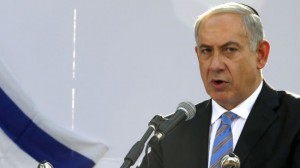 Prime Minister Benjamin Netanyahu and Defense Minister Moshe Ya�alon have ordered the army to continue preparing for a possible military strike on Iran�s nuclear facilities at a cost of at least 10 billion shekels ($2.89 billion) this year, despite the talks between Iran and the West, according to recent statements by senior military officers.
Prime Minister Benjamin Netanyahu and Defense Minister Moshe Ya�alon have ordered the army to continue preparing for a possible military strike on Iran�s nuclear facilities at a cost of at least 10 billion shekels ($2.89 billion) this year, despite the talks between Iran and the West, according to recent statements by senior military officers.Three Knesset members who were present at Knesset joint committee hearings on Israel Defense Forces plans that were held in January and February say the army�s deputy chief of staff, Maj. Gen. Gadi Eizenkot, and planning directorate official Brig. Gen. Agai Yehezkel told MKs that 10 billion shekels to 12 billion shekels of the IDF budget would be allocated this year for preparations for a strike on Iran, approximately the same amount that was allocated in 2013.
Some MKs asked Yehezkel and Eizenkot whether they felt there was justification for investing so much money in those preparations, said the MKs present at the meetings, who asked that their names be withheld because of the sensitivity of the issue. They said some lawmakers also asked whether the interim agreement reached between Iran and the six powers in November 2013, and the ongoing negotiations for a full nuclear accord, had caused any change in the IDF�s preparations.
The IDF representatives said the army had received a clear directive from government officials � meaning Netanyahu and Ya�alon � to continue readying for a possible independent strike by Israel on the Iranian nuclear sites, regardless of the talks now happening between Iran and the West, the three MKs said.
The IDF Spokesperson�s Unit declined to respond to questions by Haaretz on the matter, as did the Prime Minister�s Office.
Ever since the interim accord between Iran and the six powers was reached, Netanyahu has stressed that Israel will not consider itself bound by it. In the last few weeks, as talks on a permanent accord have resumed, Netanyahu has upped his rhetoric on the Iranian issue, and is again making implied threats about a possible unilateral Israeli strike on the Iranian nuclear sites.
�My friends, I believe that letting Iran enrich uranium would open up the floodgates,� Netanyahu said at the AIPAC conference earlier this month. �That must not happen. And we will make sure it does not happen.�
Ya�alon recently indicated during a speech at Tel Aviv University that his view has shifed and he is now likely to support a unilateral Israeli strike on Iran, in light of his assessment that the Obama administration will not do so.
�We think that the United States should be the one leading the campaign against Iran,� Ya�alon said this week. �But the U.S. has entered talks with them and unfortunately, in the haggling in the Persian bazaar, the Iranians were better. ... Therefore, on this matter, we have to behave as though we have nobody to look out for us but ourselves.�
The second round of nuclear talks opened in Vienna on Tuesday, with the participation of European Union foreign policy chief Catherine Ashton, Iranian Foreign Minister Mohammed Jawad Zarif and senior diplomats from the six powers. This was followed by a session involving the Iranian delegation and representatives of the six powers, and by separate meetings between Iranian representatives and representatives from each delegation. The U.S. and Iranian negotiating teams also met.
After the first day of talks, Ashton�s spokesman, Michael Mann, described them as �positive, serious and substantive.� Iranian media reported that officials with the Iranian delegation said this round of talks will focus on how much uranium enrichment Iran will be permitted as part of a final accord, along with the future of the heavy water plant at Arak and the lifting of sanctions.
In an opinion piece in Britain�s Financial Times this week, Zarif argued that his country is not seeking nuclear weapons and said the West�s suspicions will threaten Iran�s national security. Nuclear weapons are a tool of the past, Zarif argued, writing: �Israel�s nuclear arsenal was of little help in Lebanon in 2006.�
Zarif said Iran must convince the West that it is not seeking nuclear arms, citing the fatwa ostensibly written by supreme leader Ali Khamenei that forbids the production of nuclear weapons. The exact language of this fatwa has never been made public.
�Few now doubt that the only way to ensure that Iran�s nuclear energy programme will remain exclusively peaceful is to reach a mutually acceptable agreement,� wrote Zarif. �This shift did not occur overnight. It was prompted by the realisation that coercion, pressure and sanctions only result in more centrifuges, more resentment and deeper mistrust.�
By Haaretz
The Iran Project is not responsible for the content of quoted articles.










